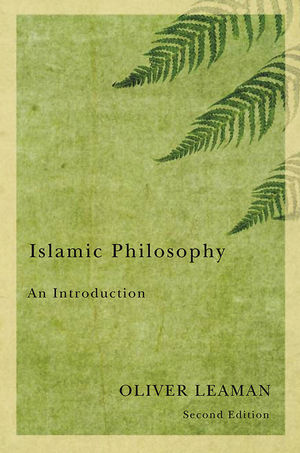Islamic PhilosophyISBN: 978-0-7456-4598-8
Hardcover
288 pages
October 2009, Polity
 This is a Print-on-Demand title. It will be printed specifically to fill your order. Please allow an additional 10-15 days delivery time. The book is not returnable.
Other Available Formats: Paperback
|
||||||
Preface to the Second Edition viii
Author’s Note and Abbreviations xi
Glossary xii
1 A SHORT HISTORY OF ISLAMIC PHILOSOPHY 1
The growth of Islam 2
Neoplatonism 3
Major thinkers 5
2 MAIN CONTROVERSIES 13
What is Islamic philosophy? 13
Early reactions to Greek philosophy in Islamic culture: the Great Debate 22
Al-Ghazali and philosophy: the question of creation 24
The nature of time 26
Mulla Sadra on change 28
Iqbal on time 29
Ibn Rushd on time 31
What can God do? 33
Miracles and meaning 34
The afterlife 36
What can God know? 37
Philosophical accounts of religious concepts 39
How free is God? 40
Essence, existence and miracles 41
The meaning of words 45
Meaning and unity 46
bi-la kayfa 48
Ibn Taymiyya on talking about God 49
3 KNOWLEDGE 51
The notion of Islamic science 52
Science and rationality 55
The nature of knowledge 56
What is knowledge for? 58
Imagination 60
Ibn Sina on knowledge and the ‘oriental’ philosophy 63
Sufi sm, knowledge and imagination 65
Knowledge by presence 67
4 MYSTICISM 71
Mysticism as a system 71
Being 74
Mysticism as a science 76
The perfect man 80
The deepening of prayer 82
Criticisms of Sufism 84
5 ONTOLOGY 86
Being and existence in Islamic philosophy 87
Ibn Rushd vs Ibn Sina on existence 87
Mulla Sadra vs al-Suhrawardi on existence 88
The equivocality of being 90
Mulla Sadra and mysticism 94
The imaginal realm 95
Different routes to one truth and the role of imagination 98
Allegory and meaning: the imaginal realm again 99
Prophecy and its psychological basis 101
Is being really the fi rst question in metaphysics? 104
6 ETHICS 106
Theological background: Mu_tazilites vs Ash_arites 106
Ethics and divine power 107
Al-Ghazali’s attack on objectivism in ethics 108
Trusting authority 112
The need for guidance 116
7 POLITICS 118
Plato vs Aristotle 118
The diversity of human beings 122
Islamic accounts of history 123
The notion of the ‘medieval’ 125
Liberalism vs Islam 129
The case of jihad 133
Modern political consequences 137
8 THE QUESTION OF TRANSMISSION 142
Philosophy and religion 142
The notion of cultural contact 146
The Andalusi connection 148
Getting back to basics 151
Falsafa and hikma: philosophy and wisdom 155
The concept of religious reason 156
The concept of inclusive reason 158
Robinson Crusoe and Hayy ibn Yaqzan 160
9 LANGUAGE 162
The case of Ibn Rushd 164
Ibn Rushd on meaning 165
Ibn Rushd and elitism 169
The Enlightenment Project 173
Ibn Rushd as a critic of mysticism 175
The implications for language 176
10 ISLAMIC PHILOSOPHY TODAY 179
The West as decadent 182
Confronting tradition 183
Islamic exceptionalism 186
Did al-Ghazali destroy Islamic philosophy? 188
11 DOES ISLAM NEED AN ENLIGHTENMENT? 191
Jewish and Muslim reactions to modernity 195
Moses Mendelssohn and Muhammad _Abduh 196
Islamic exceptionalism again 197
The Enlightenment and theology 200
Christianity as the symbol of modernity 202
The need for an Enlightenment 204
The lack of radicalism in Islamic Qur’an commentary 207
References and Bibliography 211
Guide to Further Reading 223
Index 225



